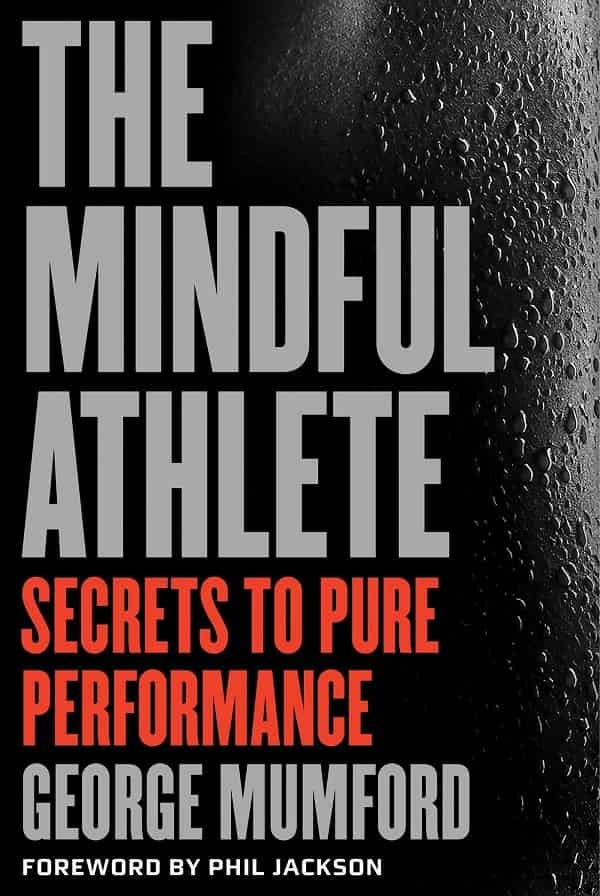Being a more mindful athlete will help you stay calm under pressure, give you a healthier perspective with your sport, and of course, help you perform your best more consistently.
George Mumford’s excellent mindfulness book, “The Mindful Athlete,” provides a detailed breakdown of the benefits of a regular mindfulness practice.
Here are some of the takeaways athletes will pull from “The Mindful Athlete.”

1. Mindfulness is difficult to measure
Confusion tends to surround mental training and mindfulness; because it’s harder to measure improvement, athletes forgo working their mindset for more subjective markers of progression.
It’s easy to see how many points you have scored, how many miles you have run, or how much weight you lifted. These clear-cut benchmarks give us the instant feedback when it comes to improvement.
Of course, there are ways that you can measure and grade your mindset in training and competition. Out of five, you could rank your self-talk, perseverance, and focus levels at practice. You can also strive to do a certain number of minutes of mindfulness training each day, giving you a way to stockpile reps.
“One of the problems with practicing meditation and cultivating mindfulness and concentration is that you can’t see or measure them. People often say, ‘Oh, this doesn’t work, I don’t see immediate results’ or ‘This is internal soft woo-woo stuff.’ But it’s like planting seeds. You don’t actually see them growing. When they first sprout, they are under the surface, invisible to the naked eye, but you know that with time and the proper attention and care, they will grow and bear fruit.”
2. Mindfulness teaches you to suffer properly.
In the same way that you can physically train the body to withstand harder workouts, faster intervals, and heavier weights, mindfulness training can make you mentally stronger.
“Mentally we can train ourselves to be comfortable with being uncomfortable, to feel calm in the midst of chaos and stay in the eye of the proverbial hurricane.”
“If you want to pursue excellence and high performance, then you have to be willing to get uncomfortable.”
“For some elite athletes it’s not even a question of will; they love to get out of their comfort zones and thrive on pressure. That was one of Michael Jordan’s defining characteristics: how much joy he could find in being in a challenging, pressure-filled situation.”
3. Mindfulness teaches you to fail like a champion.
Ah yes, adversity. You know it well. Whether it’s injury, a disappointing stretch of workouts, or a worldwide pandemic. Adversity happens.
To you, to me, to everyone.
But the thing that separates champions from the “so close but not really at all” is the ability to take adversity and use it as rocket fuel for what is next. And mindfulness is part of that.
When you can separate adversity from who you are it doesn’t decimate your confidence. You don’t hold onto failures unnecessarily. You allow yourself permission to move on and learn from them instead of relentlessly beating yourself over the head with your missteps and disappointments.
“You are not your mistakes.”
“Failure is what you make of it. Failure can be an opportunity. Mistakes are feedback for learning.”
“It’s important to remember that although we all make mistakes, we are not the mistakes. Identifying with failure is a dead-end. I work on this with athletes all the time. Some of the instinctively learn from their mistakes and have an intelligence about them that nourishes and cultivates a positive mindset. When there’s chaos, they stay in the eye of the hurricane.”
Some athletes will “relate to mistakes and failure as if they were a reflection of themselves. The identify with the mistakes, internalize it, see it as a validation of whatever negative self-talk or belief systems have been part of their emotional blueprint… Our perspective gets so narrow that there’s no way to move forward or evolve, no way to learn from the mistake that will facilitate growth.”
4. Mindfulness training shows you how powerful your breath can be.
Mindfulness training involves breathing properly. As you inhale and exhale, you get familiar with your breath, the outside world fading away. The way we breath is often put aside and forgotten. But as Mumford notes, we have become a society of shallow breathers.
“When we’re stressed, our breathing becomes even shallower, which makes us even more prone to stress.”
“Concentration on the breath in the context of athletics helps you keep focused on what’s in front of you — ball, bat, oar, water, racquet — instead of on peripheral distractions.”
5. Mindfulness training keeps you present and engaged in the moment.
Performance crashes when we dwell on the past or worry about the future. This kind of time-traveling with our thoughts means we are less engaged with the moment. How can we be expected to train or compete at a high level when our mind is elsewhere?
Mindfulness training helps you to stay in the moment, where you are more likely to get into the “Zone” and perform at a peak level.
“Mindfulness helps us stay in the present moment, focused on our purpose. When distractions or self-talk get in the way…mindfulness helps you look at those feelings with nonattachment, release them, and return your focus to the present moment and your deliberate practice.”
*
George Mumford’s book, “The Mindful Athlete,” is one of my favorite books for athletes. It is available in various formats from Amazon, including in print, as an eBook with Kindle, and on audiobook. Highly recommended for anyone who is interested in performing at a high level more consistently.


